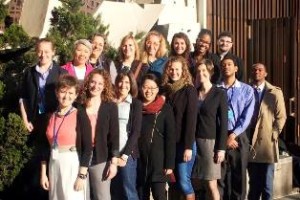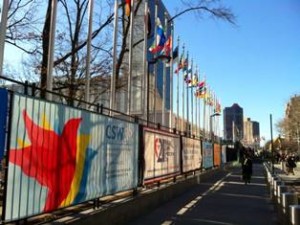Gina Tonn

March 24, 2015
Looking at a picture of the ELCA Young Adult Cohort, one might think we look like quite the random conglomeration of people – 3 men, 12 women; 13 young adults, 2 not-quite-as-young adults; 5 ELCA networks. What brings this group together, particularly around the United Nations Commission on the Status of Women (UN CSW) and gender justice?
The ELCA networks from which individuals come to the ELCA Young Adult Cohort include the Justice for Women Program, Young Adult Ministry, Strategy on HIV and AIDS, Young Adults in Global Mission alumni and ELCA World Hunger. All of these groups bring their respective priorities and goals to the cohort, but more importantly, each of us comes to the table with a commitment to and interest in the intersection of faith and justice. Gender justice, or rather gender injustice, is prevalent in the work of each of these networks. As the ELCA World Hunger network, we are aware that hunger and poverty disproportionately affect women and their children. Anthony Mell shared this example from a session hosted by The Hunger Project in Bangladesh and the UN Zero Hunger Challenge in his post on the ELCA Young Adult Cohort blog:
In Bangladesh family life it is typical for the husband and other men to be given a larger portion of food relative to the rest of the family. This simple patriarchal cultural norm has profound consequences. Because of the state of poverty in which most Bangladeshi families live, the extra food taken by the husbands leads both their wives and their children to malnutrition. The injustice does not end there. The children also often suffer these nutritional deficiencies during key periods of cognitive development, the negative results of which can greatly affect them for the rest of their lives.

Women’s equality and empowerment are prerequisites for development and eradication of hunger and poverty. Through the ELCA Young Adult Cohort and our presence at the UN CSW, ELCA World Hunger connects with other faith-based groups and non-governmental organizations (NGOs) committed to relief, advocacy, sustainable development, and grassroots organizing around the issues of hunger and poverty.
From my perspective, playing double-duty as cohort member from the ELCA World Hunger network and an ELCA World Hunger staff person, one of the most impactful aspects of the trip was witnessing and experiencing the ways in which the spirit of ELCA World Hunger’s message and mission touches people. The ELCA Young Adult Cohort did not only attend sessions; we also hosted several events. Over 100 members of the New York and New Jersey attended a “Meet & Greet” to learn about the cohort and its networks. We brought young people of faith together for conversation about justice and culture. We created space for dialogue about the church’s role in perpetuating and ending sexism and gender-based violence. Through all three of these events, and in all our interactions, I witnessed the spirit of our work to remain even as the specific content or presentation style varies to fit the setting. I believe this spirit endures because our work is firmly and clearly rooted in our identity as the church.
The ELCA Young Adult Cohort engages at the intersection of faith and justice. We also engage with the building up of young leaders in our church. These words shared during the March ELCA World Hunger Network Webinar by cohort member, seminary student and Hunger Leader Jessica Obrecht capture the connections between faith, work with ELCA World Hunger and membership in the ELCA Young Adult Cohort, and development as a leader in the church:
As I am new to the World Hunger network, it was really stark to me how connected World Hunger and the experience at the Commission on the Status of Women was…If we truly want to eradicate poverty and hunger we really need to empower women and look at how women are oppressed in different ways and the reality that 1 in 3 women has experienced gender based violence. We need to look at how that affects not only our economy, but how we function as a world interpersonally.
The fact that so many young adults participated in the experience raises the question: How do we empower young adults and pass the torch? As we listened to men and women speak about how we need to work together in the world, it was powerful to feel that we are at the table and that we are welcome to become leaders as well.
While the presentations and information sessions I attended during the UN CSW were fascinating and energizing, the time I spent with my fellow members of the ELCA Young Adult Cohort was inspiring and gives me so much joy and hope to be part of our church and have the privilege to be part of a group of convicted and passionate leaders for justice.
I will end my comments about the experience and takeaways of the United Nations Commission on the Status of Women here, and allow the words of my peers shared on the ELCA Young Adult Cohort blog during and after the UN CSW witness to the change ahead – within the church and around the world.
As a church, how do we measure gender justice? At the very least, we need sex-disaggregated data about our leadership, members, communities, institutions, and the lives the church touches. We also need qualitative data to understand how women, girls, and LGBTQ persons are viewed and valued in all areas of ministry and church life. It is assumed that having females in leadership roles or educating girls will lead to empowered women….In Bible studies and other spiritual formation, may we learn to directly address detrimental inequalities in our hearts, families, churches, communities, and world. We need to partner with others to build gender justice. Gender experts emphasize that gender is found in all sectors of life and that complicated gender issues – such as gender-based violence – must take a multi-sectoral approach. This means you can look for or assess gender in EVERY context! – Crystal Corman – Young Adults in Global Mission Alumni
Men are needed to break this silence, and the first thing to do is to become aware, a problem can’t be solved if you don’t even know it exists. – Richard Adkins – Young Adult Ministry & Strategy on HIV and AIDS
I am a youth, children, and family minister within the Evangelical Lutheran Church in America. I have returned home inspired with a renewed commitment to not only exemplify what it means to be a Christian feminist, but to be an active participant in creating a church culture that speaks about and practices taking up the cross. Within my sphere of influence, I wish to live out a theology of the cross by naming the reality and pervasiveness of sin as it is exemplified in the oppression of patriarchy and acts of gender-based violence. I will continue to recognize Christ in our midst, who bears the wounds of death, but is no longer fettered by death. I will remember the grace of the cross; that it is not our will or perfect abilities that will change the oppression of this age, but the transformative power of Christ within each of us. It is the power of Christ that strengthens us to step forward together, speak out against the reality of sin, practice forgiveness, and live remembering that the kingdom of God is among us. – Casey Cross – Young Adult Ministry
I am reminded that patriarchy is a pervasive, systemic, and viciously subtle force. It moves us and in us in ways that we struggle to conceptualize and combat. However this is not meant to be defeatist. Rather it has served to me remind of the diligence and creativity required to overcome these obstacles. Simply put combating patriarchy cannot be a part time job. – Anthony Mell – Justice for Women Program
I get overwhelmed as I learn more about the realities of women and girls in the world. And then Jesus puts it in perspective: “‘You shall love the Lord your God with all your heart, and with all your soul, and with all your mind.’ This is the greatest and first commandment. And a second is like it: ‘You shall love your neighbor as yourself.'”(Matthew 22:37-39) – Fern Lee Hagedorn – Justice for Women Program
I understand that my sisters all around the world are being raped, beaten, oppressed, silenced and ignored every single day. I understand that this problem is not just somewhere else, it is in my own country, my own state, city, community, and church. And I have a seat at this great table, amongst great minds, warm hearts, and beautiful souls. What an honor, what a privilege, what a joy, and what a responsibility that holds. – Jessica Obrecht – ELCA World Hunger & Young Adults in Global Mission Alumni
Gina Tonn is a Program Assistant for ELCA World Hunger Education & Constituent Engagement through the Lutheran Volunteer Corps. She graduated from St. Olaf College in Northfield, MN with a BA in Economics and Religion in 2014. She lives in Chicago, IL with four other Lutheran Volunteer Corps members.
